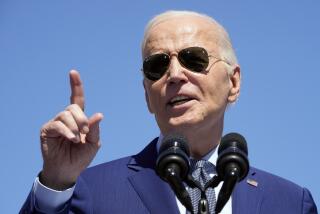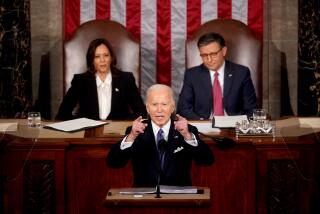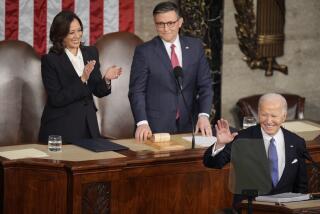Obama tries to rekindle hope in Labor Day speech
President Obama flew to Milwaukee for a fiery, populist speech on Labor Day, marking the informal kickoff of a push this fall to stave off Republican control of the Senate.
Obama’s brief visit to Wisconsin was ostensibly nonpolitical, and he avoided wading into the state’s hotly contested race for governor. But before an appreciative audience decked out in shirts proclaiming their union membership, the president hit all his party’s main campaign themes: equal pay for women, gay rights, an increase in the minimum wage, immigration reform.
With the president unpopular in many of the states that are battlegrounds this fall, his main campaign assignment, beyond raising money, will be to try to boost turnout among minorities, young people and union members, groups that make up the core of the Democratic vote and appeared well represented in Monday’s crowd.
With such audiences, Obama’s main theme will be to push back against the widespread sense of frustration about Washington that Democratic strategists fear will depress turnout of their voters this fall.
Obama cited recent job growth, expansion of conventional and renewable energy production, and improvements in manufacturing as he declared that “by almost every measure, the American economy and American workers are better off than when I took office.”
“I placed a bet on you. I placed a bet on America’s workers,” he said. The president touted a list of his administration’s accomplishments, including healthcare reform, caps on student loan repayments and executive action to raise wages for some low-paid workers.
“Every inch of it, we have had to fight for” against “lock-step opposition that is opposed to everything we do,” he said. “But it was worth it. Every gray hair is worth it.”
Republicans, who have pledged to reverse some of Obama’s moves, especially his Affordable Care Act, have a strong shot at capturing the six additional Senate seats this fall that would give them a majority. One major reason for their advantage is the greater likelihood of their supporters’ turning out to vote.
Democrats often face a turnout gap in midterm elections, but Democratic strategists say they fear that public cynicism about Washington will make the gap even bigger this year.
One strategy the party has adopted to combat that is to convince voters that gridlock is not a problem of Washington as a whole, but of the Republicans in particular.
Obama has pushed that line enthusiastically for months and returned to it Monday, saying that the “facts of life” include “the sky is blue” and “Republicans in Congress love to say no.”
One of his administration’s proposals he cited as an example of GOP “obstruction” was the proposed increase in the federal minimum wage to $10.10 an hour from the current $7.25.
“I’m not asking for the moon,” he said. “I just want a good deal for American workers.
“Folks are doing very well on Wall Street. They’re doing very well in corporate boardrooms,” he said. “Give America a raise.”
Polls consistently have shown the idea has broad public support. A Washington Post-ABC News poll in March found that 49% of registered voters said they would be more likely to vote for a candidate who supported raising the minimum wage, 22% said they would be less likely and 27% said the issue would not make a difference to them.
A recent Marquette University Law School poll in Wisconsin showed that state residents supported a higher minimum wage, 57% to 36%
But the partisan gap on the issue explains why Congress has not acted. Democrats and independents favor a minimum wage increase by a large margin; Republicans oppose it.
The Post-ABC poll, for example, found that among Republicans, 37% said they would be less likely to vote for a candidate who supported a minimum wage increase, and only 26% said they would be more likely. The opposition was strongest among conservative Republicans, with 41% saying they would be less likely to back a supporter of a higher minimum wage and only 18% saying they would be more likely to vote for such a candidate.
Unfortunately for Democrats, the party has been unable to translate broad support for a minimum wage increase into the sort of intensity that would drive voters to the polls.
White House officials and other Democratic strategists say they believe part of the problem is that a string of foreign crises have complicated their efforts to convey a consistent economic message to voters. Obama’s schedule illustrated that difficulty.
Before heading to Milwaukee, he sent Congress a formal notification under the War Powers Act that he had authorized airstrikes over the weekend in Iraq to help break the siege of the town of Amerli, where a community of Shiite Muslims, mostly members of the Turkmen minority, has been under attack by Sunni Muslim militants with the group Islamic State.
U.S. airstrikes against the militants continued Monday, with renewed attacks on positions near the Mosul dam, the Pentagon said.
On Tuesday, Obama is scheduled to leave for a three-day trip to Europe for a summit of the North Atlantic Treaty Organization and a visit to the Baltic nation of Estonia, both of which will be dominated by concerns over Russian incursions into Ukraine.
For more news on politics and policy, follow @DavidLauter on Twitter.
More to Read
Start your day right
Sign up for Essential California for news, features and recommendations from the L.A. Times and beyond in your inbox six days a week.
You may occasionally receive promotional content from the Los Angeles Times.







